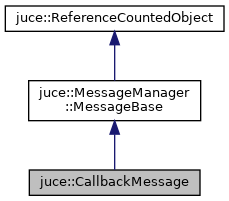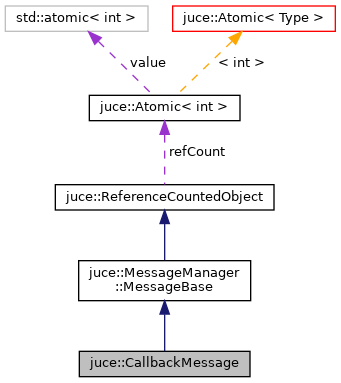A message that invokes a callback method when it gets delivered. More...
#include <juce_CallbackMessage.h>


Public Types | |
| using | Ptr = ReferenceCountedObjectPtr< MessageBase > |
Public Member Functions | |
| CallbackMessage ()=default | |
| ~CallbackMessage () override=default | |
| Destructor. More... | |
| void | decReferenceCount () noexcept |
| Decreases the object's reference count. More... | |
| bool | decReferenceCountWithoutDeleting () noexcept |
| Decreases the object's reference count. More... | |
| int | getReferenceCount () const noexcept |
| Returns the object's current reference count. More... | |
| void | incReferenceCount () noexcept |
| Increments the object's reference count. More... | |
| void | messageCallback () override=0 |
| Called when the message is delivered. More... | |
| bool | post () |
Protected Member Functions | |
| void | resetReferenceCount () noexcept |
| Resets the reference count to zero without deleting the object. More... | |
Private Attributes | |
| Atomic< int > | refCount { 0 } |
A message that invokes a callback method when it gets delivered.
You can use this class to fire off actions that you want to be performed later on the message thread.
To use it, create a subclass of CallbackMessage which implements the messageCallback() method, then call post() to dispatch it. The event thread will then invoke your messageCallback() method later on, and will automatically delete the message object afterwards.
Always create a new instance of a CallbackMessage on the heap, as it will be deleted automatically after the message has been delivered.
Note that this class was essential back in the days before C++11, but in modern times you may prefer to use MessageManager::callAsync() with a lambda.
@tags{Events}
|
inherited |
|
default |
|
overridedefault |
Destructor.
|
inlinenoexceptinherited |
Decreases the object's reference count.
If the count gets to zero, the object will be deleted.
References jassert.
|
inlinenoexceptinherited |
Decreases the object's reference count.
If the count gets to zero, the object will not be deleted, but this method will return true, allowing the caller to take care of deletion.
References jassert.
|
inlinenoexceptinherited |
Returns the object's current reference count.
|
inlinenoexceptinherited |
Increments the object's reference count.
This is done automatically by the smart pointer, but is public just in case it's needed for nefarious purposes.
Referenced by juce::ReferenceCountedObjectPtr< juce::ReferenceCountedObject >::operator=().
|
overridepure virtual |
Called when the message is delivered.
You should implement this method and make it do whatever action you want to perform.
Note that like all other messages, this object will be deleted immediately after this method has been invoked.
Implements juce::MessageManager::MessageBase.
|
inherited |
|
inlineprotectednoexceptinherited |
Resets the reference count to zero without deleting the object.
You should probably never need to use this!